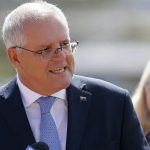Navy blues

I willingly declare myself to be a proud former member of the Royal Australian Navy, having last served on the Australian destroyer escort HMAS Swan as a commissioning crew member in 1970. While that was over half a century ago, I remain certain that current members of our Australian Defence forces regret the current government’s refusal to meet the United States’ request for an Australian ship to support allied efforts in the Red Sea to protect civilian shipping from Iranian-backed Houthi rebels in the midst of the current Middle East crisis.
When our strongest ally, the United States of America, asked Australia send one – just one – ship to support the multinational task force, I’m sure our naval officers and ranks were not only willing to meet the call, but hoped it would be their ship which ‘got the guernsey’. Not only would it be their duty to go, but the extended hard laying allowance, danger money, and qualification for war service benefits would also be welcome in this age of high inflation. If the Kiwis can send a ship, we should send two, and not be shy of seeing action.
In fact, as I suggested on November 12th following the depraved atrocity against Israeli civilians perpetrated by the Hamas terrorist sect, Australia should have supported our ally Israel in dispatching a warship to offer fire support on Israel’s northern border with Lebanon from the Mediterranean. Instead, we accommodated Palestinian sympathisers who celebrated the terrorist slaughter on the steps of Sydney’s Opera House,
Despite renewed interest in the Navy after years of neglect to counter China’s ambitions in the Pacific, Australian naval policy remains under-funded and overly dependent on the whims of foreign nations. Indeed, if Donald Trump somehow wins re-election in the United States, the much-vaunted AUKUS agreement will be dead in the water.
Politicians persist in seeing defence expenditure as an employment generator in marginal constituencies, rather than an investment in long-term national security. The stubborn insistence that Australia should build its own ships means we gain less capacity at higher cost, for example. Australian enterprises do not commission the building of their ships in Australia, but place construction contracts with Japan, Korea, India and Poland, whose proven shipyards ensure their boats are built to specification on time and on budget.
If our Navy would benefit from American and British built ships, then we should buy them. Australia lacks the trained engineers required to build modern warships, and propping up Australian labour unions by insisting on domestic production will guarantee poor quality, long delays and budget blowouts. This may benefit the localities where they are built, but is not in our nation’s best interest.
We have been down this road before. HMAS Swan and Torrens were built in Williamstown, Victoria and saw around 20 years of service before they were consigned to the deep to become artificial reefs for marine life. By contrast, the contemporaneously American purchased destroyers Perth, Brisbane and Hobart could outgun every other ship in the fleet and saw over 35 years of service, including action with the American 7th Fleet and performing fire support roles for Australia in the Vietnam war.
When I signed up in the 60’s, we were told we had the best anti-submarine navy in the world, but the threat of Japanese submarines penetrating Sydney Harbour was over and too little thought was given to future threats. Australia’s naval planners must also adjust their thinking today, not least in developing anti-drone weaponry and retrofitting it to every Australian warship.
Unfortunately, we currently lack the manpower to maintain our existing capability. Our Northern Patrol Boats operate as early warning radar pickets, for example, but are operated by composite crews made up of Army, Navy, and Air Force personnel as we lack the Navy members to do the job. Indeed, only one patrol boat in three can be manned at any one time, even with composite crewing.
Rather than pander to the vocal pro-Palestinian communities in urban electorates whose first loyalty does not seem to lie with their chosen country of residence, the Government should stand with its international allies in both word and deed. We must invest in this nation’s security, and ensure that Australia becomes a beacon for the defence of freedom once again, with both the military material and political will to protect it.
The headline photograph shows HMAS Swan beneath the towering cliffs of Fossil Bay on Maria Island off the south east coast of Tasmania and was taken by Lieutenant Evan Burton RAN.

After serving in the Royal Australian Navy, Bob Ford ran charter and fishing vessels and wrote for fishing and boating publications until retiring in 2008. Married with three children and six grandsons, his hobbies include sailing and lawn bowls.











